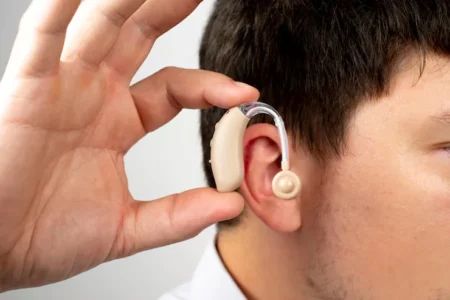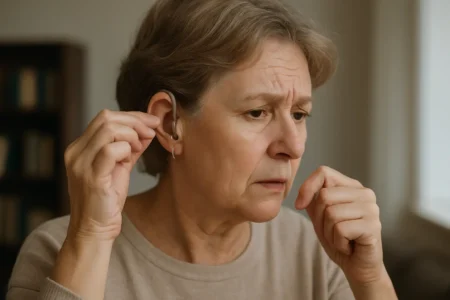The 3 Types of Hearing Loss

Hearing loss is more common than most people realize. It can sneak up slowly over time or happen suddenly—either way, it impacts how we connect with the world around us. Whether you’ve started noticing changes in your own hearing or are concerned about a loved one, understanding the different types of hearing loss is a crucial first step.
In this article, we’ll walk you through the three main types: sensorineural hearing loss, conductive hearing loss, and mixed hearing loss. We’ll explain what causes each, what the symptoms might look like, and how they’re treated. If you’re looking for answers—or just trying to make sense of what you’re experiencing—you’re in the right place.
Why Hearing Loss Happens
To get a handle on hearing loss, it helps to understand how hearing works in the first place. Your ear is made up of three key areas: the outer ear, the middle ear, and the inner ear. Sound waves travel through each part, eventually reaching the cochlea in the inner ear, where they’re turned into signals your brain can interpret.
But when something disrupts that process, hearing loss can occur. Some of the most common causes of hearing loss include:
- Natural aging (often called presbycusis)
- Long-term exposure to loud noise
- Chronic ear infections or illnesses
- Certain medications (known as ototoxic drugs)
- Head injuries or trauma
Sometimes, the signs aren’t obvious right away. If you find yourself turning up the volume on the TV or asking people to repeat themselves more often, those could be early hearing loss symptoms. For more insight, check out our blog on the Top 4 Major Causes of Hearing Loss & How to Prevent It.
Sensorineural Hearing Loss
Sensorineural hearing loss is the most common type, and it usually means there’s damage to the inner ear or the auditory nerve. This type of hearing loss is typically permanent, but the good news is there are effective ways to manage it.
What Causes It?
There are a few key culprits behind sensorineural loss:
- Age-related hearing decline presbycusis)
- Repeated exposure to loud sounds (think concerts or loud workplaces)
- Hereditary factors
- Ototoxic medications
- Illness or infection affecting the inner ear
What Does It Feel Like?
You might notice that sounds seem muffled or that conversations in noisy settings are harder to follow. People often say they can hear but do not clearly understand. Tinnitus—that annoying ringing in the ears—can also be a sign.
How It’s Diagnosed and Treated
An audiologist will perform a hearing test, including an audiogram, to determine whether you have sensorineural hearing loss. While this type of hearing loss isn’t usually reversible, hearing aids, cochlear implants, and auditory training can make a huge difference in your day-to-day communication.
Conductive Hearing Loss
Conductive hearing loss works a bit differently. Here, the issue lies in the outer or middle ear—essentially, something prevents sound from reaching the inner ear effectively. Fortunately, this type of hearing loss is often treatable.
What Causes It?
Common causes of conductive hearing loss include:
- Blockages like impacted earwax
- Ear infections that cause fluid buildup
- Perforated eardrum
- Structural issues in the ear, possibly from birth or injury
Symptoms to Watch For
This type of hearing loss can come on suddenly or fluctuate. People often describe it as feeling like their ear is “plugged.” Sounds may seem quieter or duller than usual.
Diagnosis and Treatment Options
After an exam and hearing test, treatment might involve medication, a minor surgical procedure, or a bone-conduction device, depending on what’s causing the blockage. In many cases, restoring your hearing is possible with the proper care.
Mixed Hearing Loss
Mixed hearing loss is when both sensorineural and conductive elements are present. It’s a bit more complex to manage, but people often see good results with a proper diagnosis and the right treatment plan.
How Does It Happen?
Mixed loss can result from:
- Long-term ear infections combined with age-related hearing changes
- Trauma to the head or ears
- A combination of noise damage and structural ear issues
What It Feels Like
Because it blends two types, symptoms can be more pronounced. You might experience both muffled hearing and difficulty understanding speech, whether in quiet or noisy environments. Getting a thorough evaluation is essential to figure out exactly what’s going on.
Treatment Options
Treating mixed hearing loss usually requires a combination of approaches—addressing the conductive issues medically and using hearing aids or other devices to manage the sensorineural component.
How to Tell Which Type You Might Have
So, how do you know which type of hearing loss you might be dealing with? The symptoms can overlap, which is why it’s important not to self-diagnose.
Sensorineural loss tends to make speech sound unclear, especially in noisy environments, while the conductive hearing loss may make everything sound quieter like your ears are underwater. Mixed hearing loss can feel like both.
The best way to know for sure is to get a professional hearing loss diagnosis. An experienced hearing specialist near me will conduct a complete evaluation to determine the type and severity of the issue. Understanding the stages of hearing loss can also help you know where you stand and what to expect moving forward.
Why Early Diagnosis Matters
Catching hearing loss symptoms early can make a world of difference. Untreated hearing loss has been linked to other health concerns like cognitive decline and social isolation. On the flip side, early intervention helps you:
- Stay engaged in conversations
- Avoid further deterioration
- Make simple adjustments at home or work to support better communication
Even if the symptoms seem minor now, getting a hearing test can be the first step toward staying ahead of any future changes.
Discover Hearing Centre’s Approach to Hearing Health
At Discover Hearing Centre, we believe hearing care should be personal. Whether you’re just starting to notice changes or have been living with hearing loss for years, our team is here to help you make sense of it all—and take action.
Here’s what sets us apart:
- Detailed hearing loss diagnosis and testing
- A wide range of modern hearing aids tailored to your needs
- Support for tinnitus management and relief
- Personalized guidance every step of the way
From your first consultation to ongoing care, we’ll work with you to find the right solutions for your hearing health goals.
Protect Your Hearing With Discover Hearing Centre
To recap, the three primary types of hearing loss—sensorineural, conductive, and mixed hearing loss—each has different causes, symptoms, and treatment approaches. Recognizing what you’re experiencing and getting a proper evaluation is the first step toward better hearing.
If you or someone close to you has been struggling with hearing loss symptoms, don’t wait. Book a Hearing Consultation with Discover Hearing Centre Today and take control of your hearing health. We’re here to guide you toward clearer, more confident communication—starting now.
Visit our hearing clinic in Kitchener and schedule a hearing test with our professional experts. We offer comprehensive audiology services, from hearing tests and education to digital hearing aids and personalized hearing loss treatments that put you and your specific hearing health needs at the centre. Whether you need a hearing test, are looking for invisible hearing aids or require help with hearing aid fittings and programming, Discover Hearing Centre is here for you.
Discover Hearing Centre is a local clinic specializing in the treatment of hearing loss; we’ve worked with hundreds of patients to help them maintain independence. Whether you’re experiencing hearing loss or tinnitus, we’re dedicated to improving your quality of life through better hearing. When you choose us, you choose a team committed to your well-being.
Call us today at 519-208-4327 or fill out our convenient online form to learn more about how we can help you with hearing loss issues.
You Might Also Like
Behind-the-Ear vs. In-the-Ear Hearing Aids: Which One Is Right for You?
Common Mistakes First-Time Hearing Aid Users Make and How to Avoid Them
The Link Between Tinnitus and Hearing Loss: What You Need to Know
Have Questions?
Curious about hearing loss, tinnitus relief, or treatment options in Waterloo? Talk to one of our hearing care professionals today.





